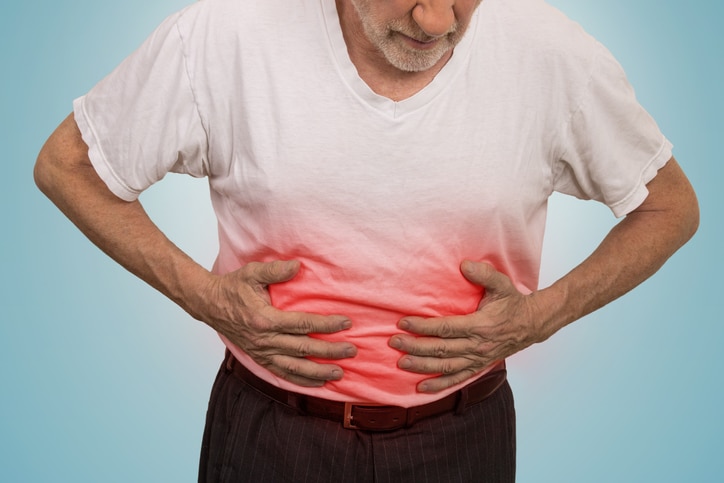It’s one of the most enduring mysteries in digestive medicine: What causes inflammatory bowel disease (IBD)?
IBD is one of the most common intestinal conditions. More than 3 million Americans suffer from it. Forms of the condition include Crohn’s disease and ulcerative colitis.[i]
IBD can make your life miserable. It causes stomach cramping, diarrhea, and fatigue. The corticosteroid drugs that are used to treat it sometimes don’t work and often have severe side effects. In serious cases of IBD, surgery may be necessary to remove damaged portions of the intestines.[ii]
Doctors have known for years that IBD was an autoimmune disease, but until recently they had no clue about what caused the body’s immune system to attack the intestines.
New research published in the journal Environmental Science & Technology points to microplastics. The study found that people with IBD have higher levels of tiny plastic bits in their feces than people without digestive problems.[iii]
Scientists took stool samples from 50 people without stomach troubles and from 52 who had IBD. They found that samples from IBD sufferers had 1.5 times more plastic.
The authors are quick to point out that their research was an observational study. Therefore, it did not prove that plastics cause IBD. Further studies will be needed for that.
But the study shows a strong association between plastics and IBD. Making the case even stronger is the fact that the link is dose-dependent. In other words, the more plastic in a subject’s stool sample, the more severe their IBD.
How Plastic Gets Into Your Gut
Microplastics are tiny pieces of plastic so small that you can’t see them. They get into your body through the water you drink, the food you eat, and the air you breathe.
The two most prevalent types of plastics found in the study were polyethylene terephthalate (PET) and polyamide (PA). PET is used in plastic water bottles. PA, better known as nylon, is found in food containers and synthetic fiber fabrics used in clothing, carpets, and furniture.[iv]
The new study found that subjects with high levels of microplastics were more likely to drink bottled water, eat takeout food out of plastic containers, and be exposed to plastic dust from carpeting and other nylon textiles.
Even if you have stomach problems that aren’t IBD, you may want to take steps to reduce your microplastic intake. Animal studies have found that microplastics cause intestinal inflammation and disrupt the “good” bacteria in your stomach needed for healthy digestion.[v]
You may be surprised about how much plastic goes into your body…
You Consume a Credit Card’s Worth of Plastic
Every Week
A 2018 study published in the journal Environmental Pollution found that the average person ingests about five grams of plastic a week. That’s the equivalent of eating a credit card.[vi] [vii]
The obvious ways to lower your plastic intake are those suggested by the study… Don’t drink bottled water and avoid eating food from plastic containers.
Here are four other ways to reduce your exposure:
- Invest in a water filter. Chances are that water comes into your home through pipes made from PVC or another plastic called PEX. Both can leach into water. Activated carbon filters and reverse osmosis systems remove them.[viii] [ix]
- Go glass. Never store or reheat food or beverages in plastic containers. Use glass or stainless steel. Foods high in fat, such as meat and cheese, are especially prone to chemical leaching from plastic. Buy products that come in glass containers instead of plastic ones whenever possible.[x]
- Get a HEPA air filter and vacuum. HEPA filters can remove microplastic dust. Put portable HEPA units in the areas of your home where you spend the most time. Use a HEPA vacuum cleaner to remove microplastic dust from floors and other surfaces.[xi]
- Replace plastic. The less plastic in your home, the less ends up in your body. When shopping, choose items with less plastic… Buy food without plastic packaging. Buy furniture made of wood, metal, or other non-plastic materials. Use a glass or metal water bottle instead of a plastic one. Use a bamboo toothbrush instead of a plastic one.[xii]
Plastic is so prevalent that it’s impossible to escape it entirely. But you can minimize your intake by taking the steps above. It may be the key to better digestion.
Editor’s Note: Unlike much of the mainstream media, we don’t accept advertising from Big Pharma. That’s why you can count on us for unbiased medical information. Our only motivation is your good health.
Subscribe to our newsletter, Independent Healing. Each month it brings you important health news you won’t find anywhere else. To subscribe, go HERE.
Related Articles
Relieve Nerve Pain by Cutting One Thing Out of Your Diet
An Extra Helping of Turkey May Help People With Gluten Issues
[i] https://www.cdc.gov/ibd/features/IBD-more-chronic-diseases.html
[ii] https://www.cdc.gov/ibd/what-is-IBD.htm
[iii] https://medicalxpress.com/news/2021-12-people-ibd-microplastics-feces.html
[iv] https://www.panaprium.com/blogs/i/polyamide-fabric
[v] https://www.sciencedaily.com/releases/2021/12/211222084024.htm
[vi] https://researchportal.hw.ac.uk/en/publications/low-levels-of-microplastics-mp-in-wild-mussels-indicate-that-mp-i
[vii] https://www.nationalgeographic.com/environment/2019/06/you-eat-thousands-of-bits-of-plastic-every-year/
[viii] https://www.alternet.org/environment/drinking-water-it-safe-when-delivered-through-plastic-pipes
[ix] https://www.todayshomeowner.com/are-plastic-water-pipes-safe/
[x] https://www.wikihow.com/Avoid-Phthalates
[xi] https://smartairfilters.com/en/blog/what-is-hepa-filter-how-hepa-filter-work/
[xii] https://learn.eartheasy.com/guides/the-best-eco-friendly-alternatives-for-the-plastic-in-your-life/

